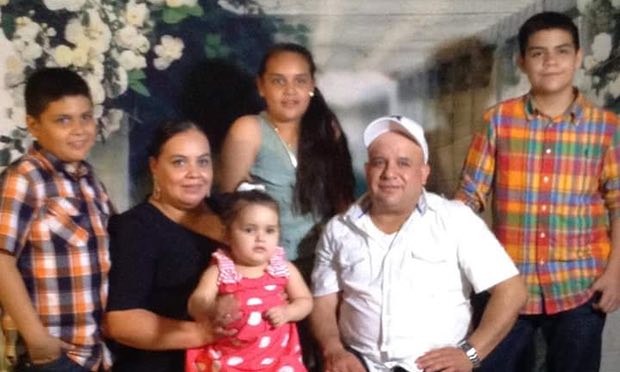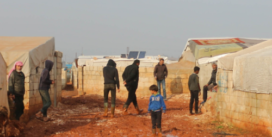- Fall Newsletter, 2025, Issue 15
- Using International Online Learning Modules to Engage Students in the Study of Critical Global Issues
- Upcoming Book Launch: Hearts of Freedom
- Announcing winners of the 2025 CARFMS Essay Contest
- The New York Declaration for Refugees and Migrants and its two Global Compacts: Addressing the Symptoms or the “Root Causes” of Forced Displacement?*
The Illegalization of Maribel Trujillo-Diaz (1/2), by Stephanie J. Silverman
In this first of a two-part contribution, I describe the case of Maribel Trujillo-Diaz. Maribel is a long-time resident of Fairfield, Ohio, United States. She is a worker in a local candy factory, and the married mother of four dependent American citizens. After cooperating fully with a series of escalating immigration enforcement requirements, Maribel was arrested in February, incarcerated in a detention centre, and slated for deportation on 19 April.
In Part II, I will discuss how Maribel’s case reflects tensions and fissures in immigration and refugee politics and law in the United States. I will outline the political and legal contexts for her case. I will also argue that the fact of Maribel’s deportation speaks to the power of the criminalization and illegalization of migrants paradigm currently dominating the United States.

Picture courtesy of the Trujillo family
Part I: Maribel’s story
On Wednesday April 19, 2017, Maribel Trujillo-Diaz, 42, was deported to Mexico. Maribel is a valued community member of Fairfield, Ohio and an American resident for fifteen years. She is the mother of four American-born children, ages three, 10, 12, and 14 years old. In addition to being the family’s wage-earner since her husband fell ill, she is also the primary caregiver for toddler Daniela who experiences seizures and for 10-year-old Gustavo who has been diagnosed with pre-diabetes. She has no criminal record, and attends church regularly.
In many ways that matter to Americans, Maribel appears to be a role model. Yet, Immigration and Customs Enforcement (ICE) agents arrested her, handcuffed her, and imprisoned her in an Ohio immigration detention centre. After the Cincinnati-based 6th U.S. Circuit Court dismissed her appeal, Maribel was transferred to a Louisiana detention centre to prepare for her deportation on 19 April 2017. She was not able to say goodbye to her kids, one of whom describes the painful experiences of living with deportability in a ‘mixed-status’ family.
Maribel had been denied asylum in 2012, had been under an ICE order of supervision, and had been meeting routinely with ICE agents since 2015. In April, she filed paperwork to reopen her asylum case based on her fear of being returned to her native Mexican state of Michoacán. Michoacán is a dangerous area plagued by violence stemming from drug cartels, vigilante gunmen, police, and the Mexican army. In the asylum paperwork, Maribel’s lawyers said her father was kidnapped by the Knights Templar drug cartel in February and the family had to pay a ransom to get him released.
Over 700 religious leaders have signed a petition arguing that no good would come from her deportation and that her family and community would be left bereft. Politicians who have intervened on her behalf include Democratic Senator Sherrod Brown of Ohio, Republican Senator Rob Portman of Ohio, and Governor John Kasich who had run against Donald Trump for the presidency.
The political context
Towards the end of its tenure, the Obama Administration constructed a pyramid of deportability for irregular residents: the ‘bad hombres’ were at the top, including often-single men who had committed felony crimes, people who posed terrorist threats, and new irregular entrants. Near the bottom, and those who were often granted leaves to stay pending annual check-ins, were youth with no criminal records, and women who had American citizen children, were married to or were themselves veterans, looked after a disabled family member, or otherwise could document a longstanding presence in the country that featured cooperation with ICE. Obama issued an executive order called Deferred Action for Parental Accountability (DAPA) to shield up to 5 million irregular residents from deportation. Although two previous Republican presidents had acted unilaterally on immigration reform, DAPA became the focus of a legal battle over its constitutionality. With a Supreme Court split down the middle, DAPA was stalled.
Nevertheless, since Department of Homeland Security (DHS) is an administrative body with its own mandate, it could quietly shift its priorities to the felons without attracting excessive public scrutiny and judicial oversight. Moreover, since it was mainly criminals – or those perceived or portrayed to be criminals – who were being deported, it seemed that the public was less interested in the mistreatment and rights violations of this population.
While in power, Obama had been weighing a full amnesty provision for some of the millions of children who had been brought to the US irregularly or had overstayed visas. This group is known as the DREAMers, after the DREAM Act / or the 2012 Deferred Action for Childhood Arrivals (DACA) Act that set thousands of people on a presumed path to permanent residence. Many of them identified as Americans in all but formal citizenship status. DREAMers had been publicly “coming out” of the shadows, including on the cover of Time Magazine. Although only ever partially protected from removal, many had registered with authorities through DACA, or what Trump called an “unconstitutional executive amnesty” in an August 2016 speech.
In this climate, Maribel was known to ICE but there were no plans to deport the mother-of-four. In 2014, she was formally put into deportation proceedings. Nevertheless, she was granted a work permit and told she could stay provided that she did not abscond. Maribel had faithfully attended every subsequent meeting and informed ICE of any personal changes.
The Trump Era Begins
Maribel’s fate, and that of millions of other people, has changed dramatically with the election of President Trump. A key Trump campaign promise was to enhance immigration enforcement. He spoke repeatedly of building a southern border wall and making Mexico pay for it, and also of detecting, arresting, and swiftly deporting many of the approximately 11.3 million undocumented people living in the US. DHS also plans to add 20,000 beds to the US detention leviathan to indefinitely incarcerate women and children migrating from Central America. The plan is to separate moms from their kids, thereby providing a disincentive for families to flee to the US. If the DHS is willing to use detention to break apart families in order to deter others from exercising their human right to seek asylum, cases like Maribel’s or those of the DREAMers would probably not morally trouble the Administration too heavily.
Since capturing the White House, President Trump has appointed a new DHS secretary, a new Customs and Border Patrol chief, ousted the Department of Justice head, and ordered a string of immigration raids. Yet, he has softened his public stance on who his raids aim to net. In particular, and despite the high-profile arrests and detentions of DREAMers, President Trump seems to be wavering on what to do about them en masse. For instance, on February 16, he conceded that “DACA is a very, very difficult subject for me .… It’s one of the most difficult subjects I have because you have these incredible kids.” Likewise, in a news brief on 13 February, he said:
“We’re actually taking people that are criminals – very, very hardened criminals in some cases with a tremendous track record of abuse and problems – and we’re getting them out.”
Nevertheless, it seems that April saw the first deportation to Mexico of a DREAMer. Juan Manuel Montes, 23, had come to the US when he was 9 years old, and had qualified for DACA amnesty twice; at the time of his rushed deportation, he had been protected from removal until 2018.
Maribel is not a terrorist, nor a flight risk, nor a criminal. She ticks none of the boxes described by Trump. Nevertheless, in February 2017, ICE told Maribel that the stay was off, and that she should prepare for deportation to Mexico. In an interview with the Guardian newspaper conducted before she was detained, she explained the Sophie’s Choice confronting her:
“I don’t understand the reason to separate my family. I have no criminal record, I’m here working to support my family, so that my kids can study and have a better life for themselves. Why does President Trump want to divide my family and make me leave my kids behind – what are they going to do without their mama?”
To be continued.
Stephanie J. Silverman is Bora Laskin National Research Fellow in Human Rights, and Secretary of CARFMS.
With thanks to Petra Molnar and the CARFMS Blog Committee for helpful comments.
